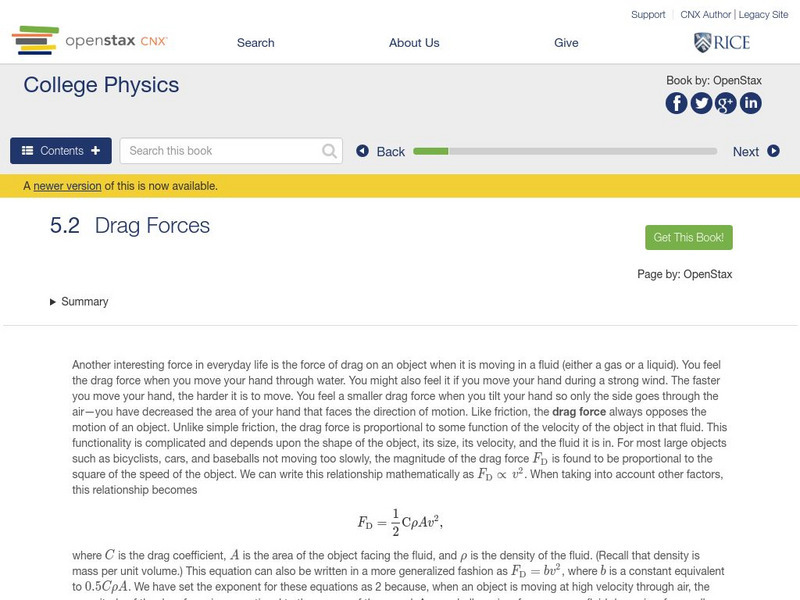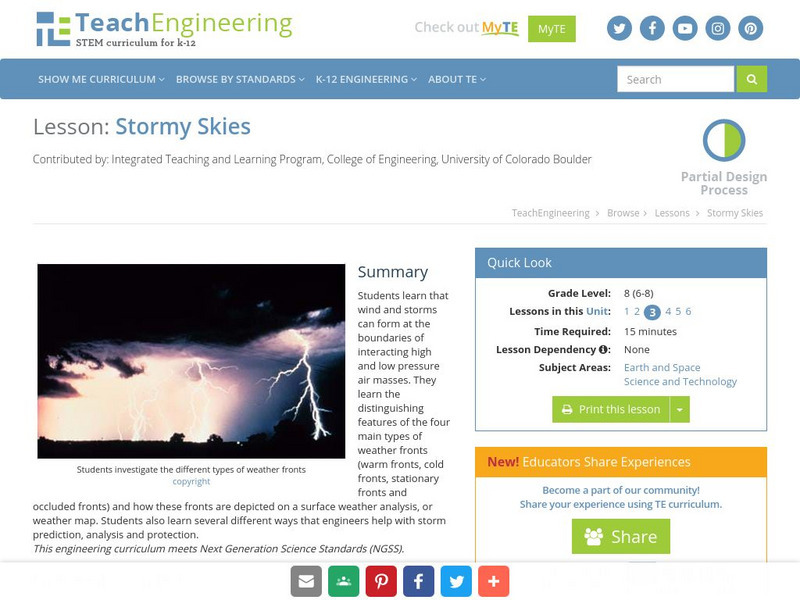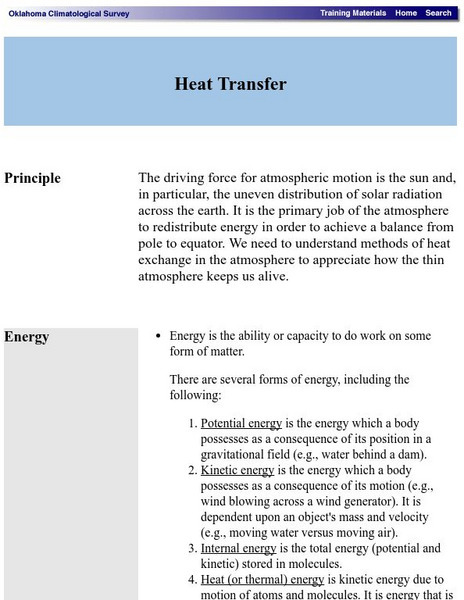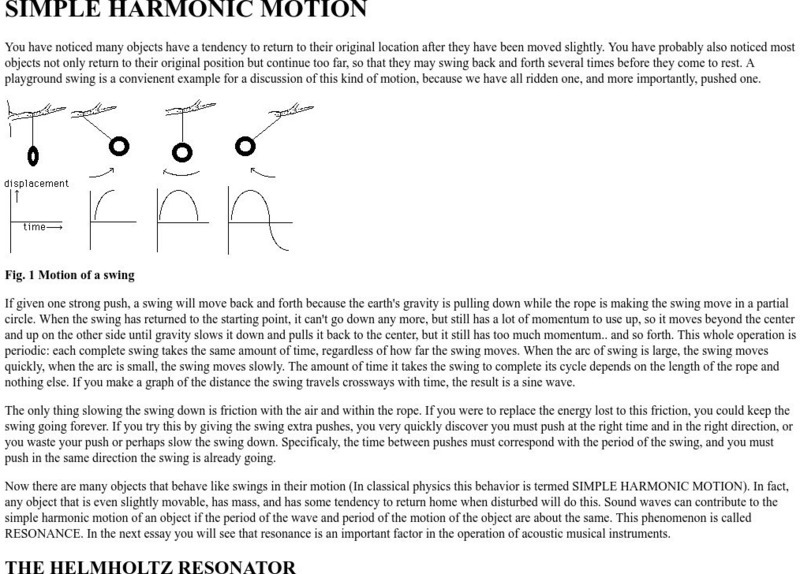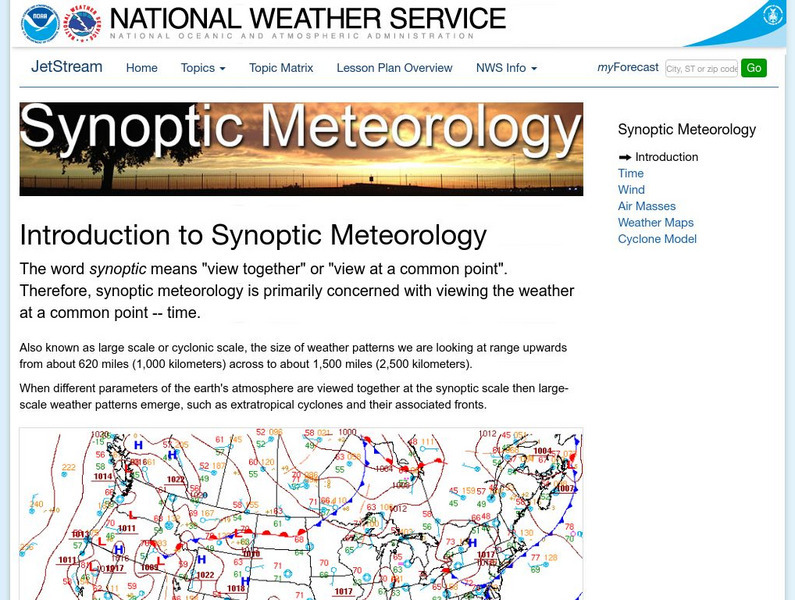Hi, what do you want to do?
OpenStax
Open Stax: College Physics: Drag Forces
In the following tutorial, students will learn how to express mathematically the drag force and also discuss its applications. They will also define terminal velocity and determine the terminal velocity given mass.
TeachEngineering
Teach Engineering: Environment
Through 10 lessons and more than 20 hands-on activities, students are introduced to the concept of an environment and the many interactions within it. As they learn about natural and human-made environments, as well as renewable and...
University of Colorado
University of Colorado: Ph Et Interactive Simulations: Projectile Motion
An interactive simulation that teaches about kinematics, air resistance, and parabolic curve by shooting a car out of a cannon while trying to hit a target. Observe how changes in angle, initial speed, mass, air resistance, and drag...
CK-12 Foundation
Ck 12 Exploration Series: Simulations: Physics: Tire Pressure
[Free Registration/Login Required] Uncover the relationship between pressure, force, and contact area in the context of a fire truck. Play with vehicle mass, number of tires, and guage pressure with this simulation to see what...
American Chemical Society
Middle School Chemistry: Lesson Plans: What Is a Chemical Reaction?
After observing a demonstration of a chemical reaction between a burning candle and the oxygen in the air, students use atom model cut-outs to model the reaction and see that all the atoms in the reactants show up in the products.
TeachEngineering
Teach Engineering: Stormy Skies
Learners learn that wind and storms can form at the boundaries of interacting high and low pressure air masses. They learn the distinguishing features of the four main types of weather fronts (warm fronts, cold fronts, stationary fronts...
Oklahoma Mesonet
Oklahoma Climatological Survey: Heat Transfer
A discussion from the Oklahoma Climatological Survey of the thermal factors effecting the movement of air masses in the atmosphere. Numerous topics such as methods of heat transfer, latent heat, phase changes (including sublimation and...
Curated OER
Unesco: Niger: Air and Tenere Natural Reserves
This is the largest protected area in Africa, covering some 7.7 million ha, though the area considered a protected sanctuary constitutes only one-sixth of the total area. It includes the volcanic rock mass of the Air, a small Sahelian...
American Geosciences Institute
American Geosciences Institute: Wind Classroom Activities
When air is warmed, it expands and becomes less dense. As the air becomes less dense, its air pressure decreases. This occurs because molecules in warm air have greater kinetic energy (energy of motion) than in cold air. As the molecules...
Other
Ucsc Electronic Music Studios: Simple Harmonic Motion
Simple harmonic motion is described and explained and related to a Helmholtz resonator. Relation between simple harmonic motion and a vibrating air column is clearly made in an effort to explain why a pop bottle resonates when blowing...
TeachEngineering
Teach Engineering: Backyard Weather Station
In this hands-on activity, students use their senses to describe what the weather is doing and to predict what it might do next. After gaining a basic understanding of weather patterns, students will become state park engineers and build...
Other
Yukon College: Geographic Concepts: Introduction to Circumpolar Geography
This article explains the geography of the circumpolar north, which includes northern Eurasia. Read about the different climates and ecozones in this area. Includes student assignments.
PBS
Pbs Teachers: Vanished: Inside the Jet Stream: Giving Rise to the Jet Stream
Explore what generates a jet stream, and discover why they flow from west to east. A link is offered in this site to a helpful animation describing the jet stream process.
Discovery Education
Discovery Education: Physical Science: Gravity Gets You Down
In this lesson, young scholars make predictions about falling objects of different sizes and masses to learn about gravity and air resistance. Includes audio vocabulary list and extension activities.
Physics Classroom
The Physics Classroom: Newtons Laws: Rocket Sledder Interactive
Experience the effect of friction, air resistance, and applied force upon a sledder. The speed, acceleration, and force values are displayed as the sled moves. Learners can vary the mass of the sledder and the size of the parachute...
Physics Classroom
The Physics Classroom: Newtons Laws: Skydiving Interactive
Students explore the motion of an object falling under the influence of air resistance. Force arrows and values are shown as the object falls, and a speedometer displays the speed of the object. The mass of the falling object and the...
Science Education Resource Center at Carleton College
Serc: Hands on Meteorology
A collection of interactive concept models and active learning materials for teaching meteorology that illustrate conceptually difficult processes in atmospheric science. Active learning exercises are provided as guided instruction to...
National Weather Service
National Weather Service: Jetsream: Synoptic Meteorology
The National Weather Service presents this site on synoptic meteorology, large-scale weather systems. Learn about the structure and behavior of the atmosphere, including clouds, precipitation, winds and more. Also includes learning...
TeachEngineering
Teach Engineering: Tornado!
Students learn about tornadoes - their basic characteristics, damage and occurrences. Students are introduced to the ways that engineers consider strong winds, specifically tornadoes, in their design of structures. Also, students learn...
NOAA
Noaa: Weather Systems and Patterns
Imagine our weather if Earth were completely motionless, had a flat dry landscape and an un-tilted axis. This, of course, is not the case; if it were, the weather would be much different. The local weather that impacts our daily lives...
University Corporation for Atmospheric Research
Ucar: Weather Images
Photos, diagrams, and other images related to weather.
University Corporation for Atmospheric Research
Ucar: Icy Winter Weather
When meteorologists forecast a winter storm one of the important predictions they make is the type, or types, of precipitation that are likely to fall. Will freezing rain cause an ice storm? Will ice pellets called sleet leave the ground...
Other
Kean: Weather Systems [Pdf]
No scientific phenomena concern us as much as the daily evolution of weather systems. We live in a culture where weather, the state of the atmosphere at a given time and place,helps us define regional cultural variations. States such as...
Other popular searches
- Air Masses and Fronts
- Weather Fronts Air Masses
- Cold Air Masses
- Air Masses and Weather
- Weather Air Masses
- Weather Fronts and Air Masses
- Air Masses Oklahoma
- Polar Air Masses
- Air Masses Collide
- Air Masses Fronts
- Air Masses, Fronts
- Air Masses and Air Fronts





